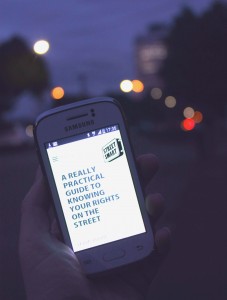 “The first interaction with police here … I felt quite invaded. I’d want to know where I legally stand in that situation. I’d want to know how to remove myself from that situation.”
“The first interaction with police here … I felt quite invaded. I’d want to know where I legally stand in that situation. I’d want to know how to remove myself from that situation.”
Justin* age 18
Would you know what to do if a police officer ordered you to move on? What if a Protective Services Officer asked you for your name and address? Can a ticket inspector arrest you?
Youthlaw answers these questions and more with StreetSmart: a smartphone-friendly website that explains the law in plain English. Designed to be just as easy to use on your smartphone as it is on a tablet or desktop, StreetSmart has all the legal information you need to know about police, PSOs, ticket inspectors and security guards as well as useful tips on how to handle yourself.
Developed in collaboration with young people and design researchers at Paper Giant, a design consultancy based in Melbourne, StreetSmart is the first website of its kind in Victoria.
“For the young people that Youthlaw help, their mobile phone is the only way they access the Internet, so it was important to combine information that was easy to understand with a design that made it easy to use on a phone,” says Reuben Stanton, Paper Giant’s designer.
Young people were involved closely in the design of the website, through interviews and testing of early versions.
“During our research with young people, we found that there was no reliable and easy to understand source of information for them to learn about their rights,” says Chris Marmo, a researcher at Paper Giant. “It was important to make something that didn’t read like a typical legal document.”
The website is now live at www.streetsmartvic.com.au
*not his real name
Youthlaw lawyers now available as guest speakers to talk about StreetSmart at schools, VCAL classes and other programs for young people. For more info, contact Annie Davis on 9611 2433 or email education@youthlaw.asn.au
